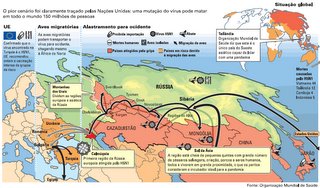European health experts take stock of influenza pandemic preparedness
 At a conference jointly organised by the European Commission and the Regional Office for Europe of the World Health Organisation (WHO) in Copenhagen (Denmark) on 24-26 October, European health experts addressed the state of play of preparations for a possible flu pandemic. All 25 EU Member States now have national preparedness plans, as do 21 other countries in the WHO’s European region. However, additional efforts are needed as far as funding, testing and implementation of these plans are concerned. On avian influenza (AI), discussions focused on improving surveillance and information sharing, on compensation of farmers, on protection of poultry sector workers and on detection of AI in humans. On influenza pandemic preparedness, the experts called for the strengthening of aspects other than pharmaceutical interventions in national plans, such as civil protection, transport, communications and health systems response, setting up emergency centres, investing in labs, and encouraging vaccination between pandemics. On the role of international organisations, recommendations focused on setting internationally accepted standards and guidelines and sharing information.
At a conference jointly organised by the European Commission and the Regional Office for Europe of the World Health Organisation (WHO) in Copenhagen (Denmark) on 24-26 October, European health experts addressed the state of play of preparations for a possible flu pandemic. All 25 EU Member States now have national preparedness plans, as do 21 other countries in the WHO’s European region. However, additional efforts are needed as far as funding, testing and implementation of these plans are concerned. On avian influenza (AI), discussions focused on improving surveillance and information sharing, on compensation of farmers, on protection of poultry sector workers and on detection of AI in humans. On influenza pandemic preparedness, the experts called for the strengthening of aspects other than pharmaceutical interventions in national plans, such as civil protection, transport, communications and health systems response, setting up emergency centres, investing in labs, and encouraging vaccination between pandemics. On the role of international organisations, recommendations focused on setting internationally accepted standards and guidelines and sharing information.European Health and Consumer Protection Commissioner Markos Kyprianou said: “We now have a much clearer picture of the preparedness of EU Member States for dealing with a possible human influenza pandemic. I welcome the fact that all twenty five Member States now have national preparedness plans in place. We have made progress in recent months, which is not to say that we can rest on our laurels, as there is more progress to be made. The Commission will continue to support and coordinate the work of Member States in this area so that we all achieve as high a level of preparedness as possible.”Participants called for boosting co-operation between countries on the international and European level, including on issues such as disease surveillance, better harmonisation of control measures between neighbouring countries, and risk communication. They also called for strengthening the capacity of public health systems for the early and rapid detection of and response to possible flu pandemic, improving co-operation between health and veterinary systems, and encouraging dialogue with farmers. Developed, and in particular European, countries should also help most exposed countries, such as developing countries, to address the lack of human and technical resources in the veterinary and medical field to tackle outbreaks.
While stockpiling antiviral drugs and ensuring timely production of pandemic vaccines are important, the participants also called for national preparedness plans to address other elements, such as strengthening surveillance, laboratory capacity, training of personnel, and communication systems. New antiviral drugs can help slow down an outbreak and buy time for vaccine development, but they must be used responsibly, to avoid the creation of drug-resistant strains. For further information, please visit:
http://europa.eu.int/comm/dgs/health_consumer/dyna/influenza/index.cfm

<< Home